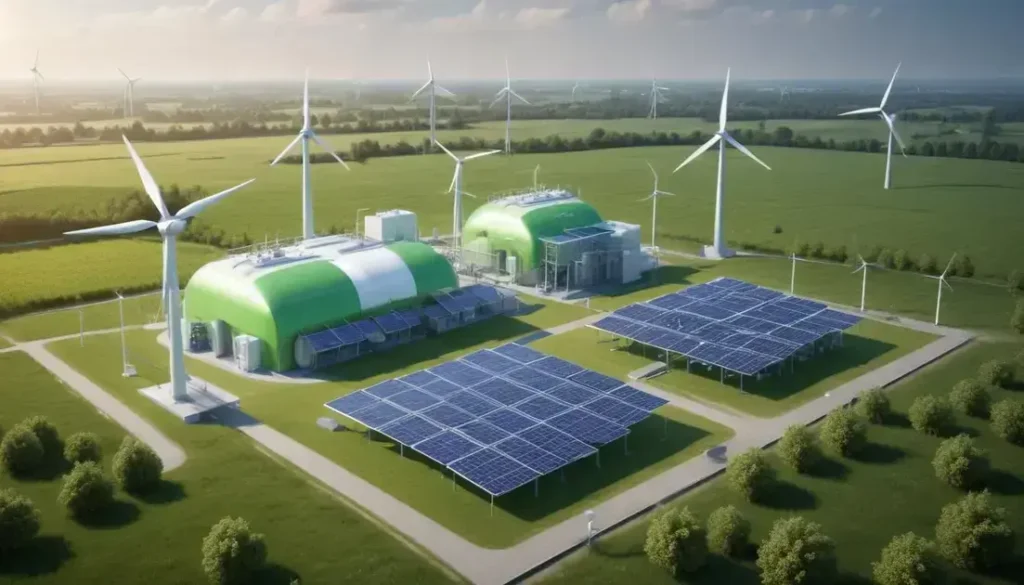Sustainable Aviation Fuel (SAF) is a renewable alternative to traditional jet fuel, significantly reducing carbon emissions in the aviation industry while supporting global sustainability goals.
The recent SBTi Validation confirms Virgin Atlantic’s commitment to sustainability and carbon reduction, making a notable impact in the aviation sector. How does this affect Australian businesses?
What is SBTi Validation?
SBTi Validation refers to the approval process conducted by the Science Based Targets initiative (SBTi) to ensure that climate targets set by companies align with the goals of the Paris Agreement. This initiative encourages organisations to establish targets that are scientifically robust and impactful in combating climate change.
A key aspect of SBTi Validation is the requirement for companies to commit to reducing greenhouse gas emissions in line with a 1.5°C temperature increase. Validated targets provide a credible and transparent approach for businesses aiming to demonstrate their commitment to sustainability. This not only enhances their reputation but also builds trust with customers and investors.
Companies that undergo this validation showcase their proactive stance towards addressing environmental challenges. The process often includes a thorough assessment of their emission reduction plans, ensuring that these targets are not only ambitious but also achievable. As more businesses pursue SBTi Validation, it becomes a vital tool in the global effort to limit climate change.
Virgin’s Net-Zero Targets Explained
Virgin’s Net-Zero Targets represent a critical commitment to sustainability and the fight against climate change. The company aims to achieve net-zero carbon emissions by 2050, aligning its operational strategies with global climate goals. This initiative is in response to the growing need for businesses to take responsibility for their environmental impact.
To reach these targets, Virgin plans to implement a range of sustainable practices. This includes investing in renewable energy, enhancing fuel efficiency, and supporting innovative technologies such as Sustainable Aviation Fuel (SAF). SAF can significantly reduce lifecycle carbon emissions compared to traditional jet fuels, making it a key element in Virgin’s sustainability plans.
Moreover, Virgin is dedicated to collaborating with industry partners and stakeholders to create a more sustainable aviation sector. By sharing knowledge and resources, they aim to drive collective action in reducing emissions across the industry. Transparency in progress reporting will also play a vital role in ensuring accountability and fostering trust with customers.
As the aviation industry faces increasing scrutiny regarding its carbon footprint, Virgin’s proactive approach positions it as a leader in the transition towards a more sustainable future. Their net-zero targets serve not only as an internal benchmark but also as an influential example for other businesses to follow.
Impact of SBTi on Climate Goals
The impact of SBTi on climate goals is profound, as it establishes a framework that companies can follow to align their emissions reduction targets with scientific consensus. By utilising the Science Based Targets initiative, organisations commit to measurable, actionable, and credible climate strategies.
These targets not only help businesses understand their role in environmental sustainability but also set a benchmark for accountability. Companies that adopt SBTi-aligned targets demonstrate leadership in their industries, signalling to investors and customers a genuine commitment to reducing their carbon footprints.
Furthermore, the SBTi promotes innovative practices and technologies, driving firms to invest in low-carbon solutions. As businesses strive to meet these stringent targets, they often uncover opportunities for operational efficiencies and cost savings through more sustainable practices.
As a result, the broader implications of SBTi on global climate goals are significant. When multiple companies commit to SBTi standards, it collectively contributes to the aim of limiting global temperature rise to well below 2 degrees Celsius, ultimately supporting the Paris Agreement. In this way, the SBTi acts as a catalyst for change across industries, fostering a sustainable future.
Australian Businesses and Carbon Emissions
Australian businesses play a crucial role in addressing carbon emissions, as they contribute significantly to the country’s overall greenhouse gas output. Many companies are now recognising the importance of sustainable practices as a driver for change, both for regulatory compliance and long-term profitability.
By adopting strategies to reduce emissions, Australian businesses not only meet government targets but also enhance their market competitiveness. This shift is often motivated by growing consumer demand for environmentally responsible products and services. Companies that lead in sustainability can differentiate themselves, attracting environmentally conscious customers.
The introduction of carbon pricing and various government incentives are also pushing organisations to innovate. For instance, businesses are exploring renewable energy options, improving energy efficiency, and investing in carbon offset programs. These actions are vital for achieving carbon neutrality goals.
Furthermore, collaboration among businesses, government, and community stakeholders is essential. Initiatives like collective carbon reporting and knowledge sharing pave the way for a more unified approach to tackling emissions. As Australian organisations continue to align their operations with climate goals, their collective efforts will be critical in steering the nation toward a sustainable future.
The Role of Sustainable Aviation Fuel (SAF)
Sustainable Aviation Fuel (SAF) plays a pivotal role in reducing the carbon footprint of the aviation industry. As airlines commit to achieving net-zero emissions, SAF provides a viable alternative to traditional jet fuel, enabling significant reductions in greenhouse gas emissions.
Produced from renewable resources, SAF can lower lifecycle carbon emissions by up to 80% compared to conventional fuels. This makes it a key component in the transition to a more sustainable aviation sector. Various feedstocks, including waste oils and agricultural residues, are used to produce SAF, showcasing the potential for circular economy practices within the industry.
The usage of SAF not only helps airlines meet their emissions targets but also supports energy security by diversifying fuel sources. Major airlines have begun incorporating SAF into their operations, indicating a growing acceptance and demand for this innovative solution.
Government policies and incentives further accelerate the adoption of SAF. Initiatives aimed at fostering research, development, and infrastructure for SAF production are essential for scaling its use across the fleet. By investing in SAF, the aviation industry can take significant steps toward mitigating climate change while maintaining its vital role in global connectivity.
Regulatory Landscape for Sustainability
The regulatory landscape for sustainability is constantly evolving, reflecting global efforts to address climate change and promote environmental stewardship. Governments worldwide are implementing a range of regulations aimed at encouraging businesses to adopt sustainable practices. These regulations are crucial for ensuring accountability and compliance in the pursuit of net-zero emissions.
In Australia, there are several key frameworks that guide corporate sustainability initiatives. The National Greenhouse and Energy Reporting Scheme mandates large businesses to report their greenhouse gas emissions, fostering transparency and driving improvement. Additionally, various state and federal incentives are designed to support a transition towards renewable energy and sustainable practices.
Moreover, international agreements, such as the Paris Agreement, influence local regulations and corporate policies by setting ambitious targets for emissions reduction. Companies are increasingly aligning their operations with these global standards, not only to comply but also to harness marketing opportunities associated with sustainability.
As regulatory bodies tighten requirements, businesses must stay informed and adaptable. Embracing sustainability becomes not just a compliance issue but a strategic advantage. Companies that proactively address regulatory changes can enhance their reputations and customer loyalty, making sustainability a cornerstone of their operational strategies.
Challenges in Aviation Decarbonisation
Decarbonisation in aviation presents numerous challenges that require urgent attention. One of the primary hurdles is the heavy dependence on fossil fuels for aircraft operations. The aviation sector relies on traditional jet fuel, which contributes significantly to carbon emissions. Transitioning to alternative fuels such as Sustainable Aviation Fuel (SAF) is essential, but production capacity and availability remain issues.
Moreover, the existing aviation infrastructure is largely designed around conventional fuels, creating barriers to adopting greener technologies. Airports and refuelling systems must evolve to accommodate new fuel types, which requires substantial investment and time.
Another significant challenge is the high cost associated with decarbonisation efforts. Developing and implementing new technologies for efficiency or emissions reduction can be financially daunting for many airlines. Research and development in this area also require substantial funding and collaboration among industry stakeholders.
Additionally, regulatory frameworks must adapt to support aviation decarbonisation. Changing public policies to incentivise sustainable practices can take time, and until then, many airlines may hesitate to invest in cleaner technologies. Addressing these challenges is crucial for paving the way toward a low-carbon future in aviation.
Innovations for Carbon Reduction
Innovations for carbon reduction are essential in the fight against climate change. Various technologies and strategies have emerged, aiming to decrease greenhouse gas emissions across multiple sectors. One of the most promising areas is the development of renewable energy sources, such as wind, solar, and hydroelectric power. These alternatives are critical in reducing reliance on fossil fuels.
In addition to renewable energy, energy efficiency technologies are playing a significant role. These innovations include advanced insulation materials, energy-efficient appliances, and smart grid systems that optimise electricity use. By improving energy efficiency in homes and businesses, emissions are significantly lowered.
Another crucial innovation is the advancement of carbon capture and storage (CCS) technologies. CCS enables industries to capture carbon dioxide emissions at the source and store them underground, preventing them from entering the atmosphere. This technology is increasingly being integrated into power plants and manufacturing processes.
Furthermore, sustainable agricultural practices are gaining traction in reducing emissions from the agricultural sector. Techniques like regenerative farming and precision agriculture help sequester carbon in soil, while minimising resource usage. These combined innovations not only mitigate climate impact but also support the transition to a more sustainable future.
Future Steps for Virgin Atlantic
Future steps for Virgin Atlantic are focused on achieving their ambitious sustainability goals and transforming the airline industry. As the airline strives to become a leader in carbon neutrality, prioritising the use of Sustainable Aviation Fuel (SAF) is paramount. This commitment involves increasing the percentage of SAF used in their operations, collaborating with fuel suppliers, and investing in innovative fuel technologies.
Moreover, Virgin Atlantic is looking to enhance operational efficiency by upgrading its fleet to more modern aircraft that produce fewer emissions. This includes the introduction of newer models designed for fuel efficiency, which will contribute to their overall carbon reduction strategy.
Engaging with passengers plays a crucial role in Virgin’s approach. The airline aims to educate travellers about environmental issues, encouraging them to make sustainable choices while flying. This includes promoting options such as carbon offsetting programs to allow customers to contribute directly to sustainability efforts.
Additionally, Virgin Atlantic is committed to collaborations within the aviation sector to facilitate industry-wide changes. By partnering with other airlines, governments, and organisations, they aim to establish best practices and create a framework for future sustainability initiatives. These concerted efforts will ensure that Virgin Atlantic remains at the forefront of green aviation.
Collaborative Efforts in Sustainability
Collaborative efforts in sustainability are essential in addressing the pressing challenges posed by climate change. Various stakeholders, including governments, businesses, and non-profit organisations, are joining forces to develop innovative solutions that promote environmentally friendly practices. These collaborations often lead to shared resources and expertise, enabling more significant progress toward sustainability goals.
One prominent example of successful collaboration is the establishment of industry coalitions focused on reducing carbon emissions. These coalitions facilitate knowledge sharing and help set industry standards for sustainability. By working together, companies can identify best practices and implement effective strategies that contribute to a greener future.
Moreover, partnerships between the public and private sectors are increasingly vital. Government initiatives that provide incentives for sustainable practices encourage businesses to adopt renewable energy sources and improve energy efficiency. Such government support not only drives sustainability but also boosts economic growth by creating green jobs.
Community engagements also play a crucial role in these collaborative efforts. Local initiatives, such as clean-up campaigns and environmental education programs, raise awareness and encourage participation among the public. Through these combined efforts, we can foster a culture of sustainability that empowers individuals and communities to contribute actively to environmental protection.
In Summary: The Path to Sustainable Aviation
The journey towards sustainability in aviation is a collective effort that involves various stakeholders. Companies like Virgin Atlantic are setting strong examples by embracing innovations, investing in Sustainable Aviation Fuel (SAF), and enhancing operational efficiencies.
Collaborative efforts between businesses, governments, and communities are crucial. By working together, we can create effective strategies to reduce carbon emissions and promote environmental stewardship.
As the industry continues to face challenges, these partnerships will play an essential role in driving progress. By remaining committed to sustainability and sharing knowledge, we can pave the way for a greener future in aviation.
Ultimately, every step counts. Whether through individual actions or large-scale industry changes, everyone has a role to play in creating a more sustainable world.
Frequently Asked Questions
What is Sustainable Aviation Fuel (SAF)?
Sustainable Aviation Fuel (SAF) is a renewable fuel made from sustainable resources that significantly reduces greenhouse gas emissions compared to traditional jet fuels.
How are airlines like Virgin Atlantic addressing carbon emissions?
Airlines like Virgin Atlantic are investing in Sustainable Aviation Fuel, upgrading their fleets for efficiency, and collaborating with industry partners to reduce carbon emissions.
What are the main challenges in aviation decarbonisation?
Key challenges include the reliance on fossil fuels, the need for infrastructure upgrades, high costs associated with new technologies, and evolving regulatory frameworks.
Why is collaboration important in sustainability efforts?
Collaboration fosters knowledge sharing, resource pooling, and accelerates the development and implementation of effective sustainability strategies across industries.
How can passengers contribute to sustainable aviation practices?
Passengers can participate by choosing airlines with strong sustainability initiatives, offsetting their carbon emissions, and supporting eco-friendly travel options.
What future steps should airlines take for sustainability?
Airlines should continue investing in new technologies, adopt more Sustainable Aviation Fuel, and engage in partnerships to achieve industry-wide sustainability goals.


